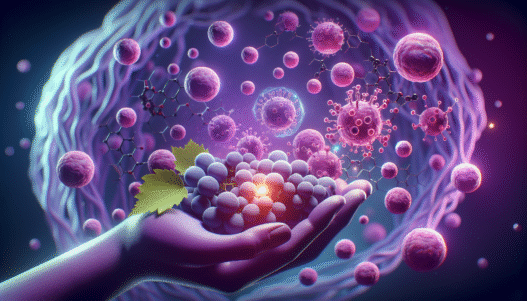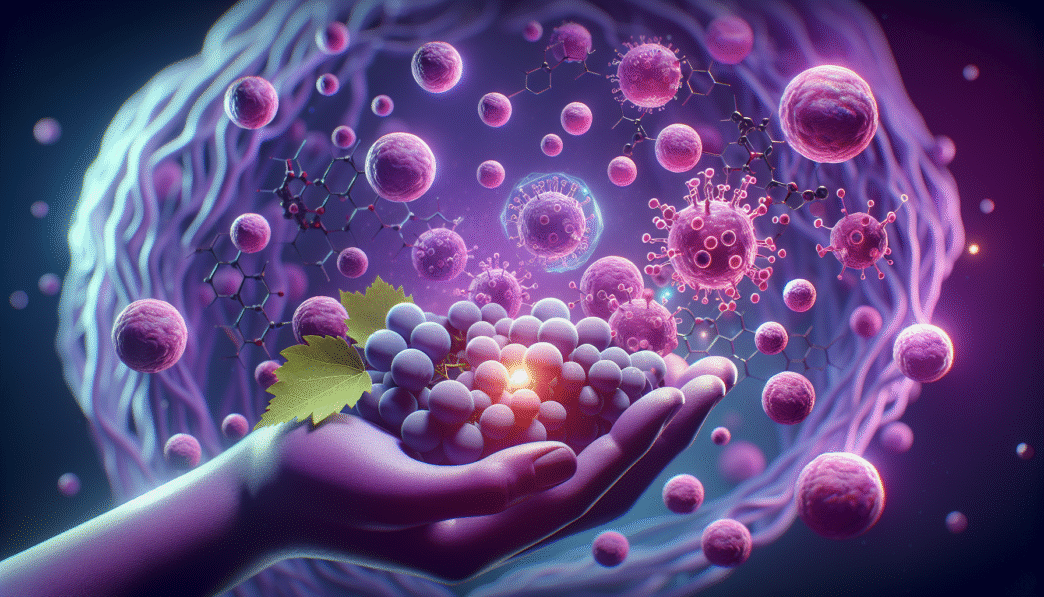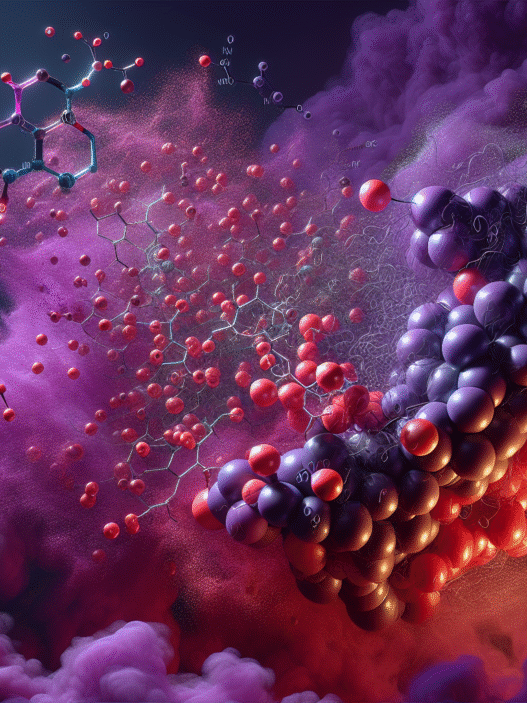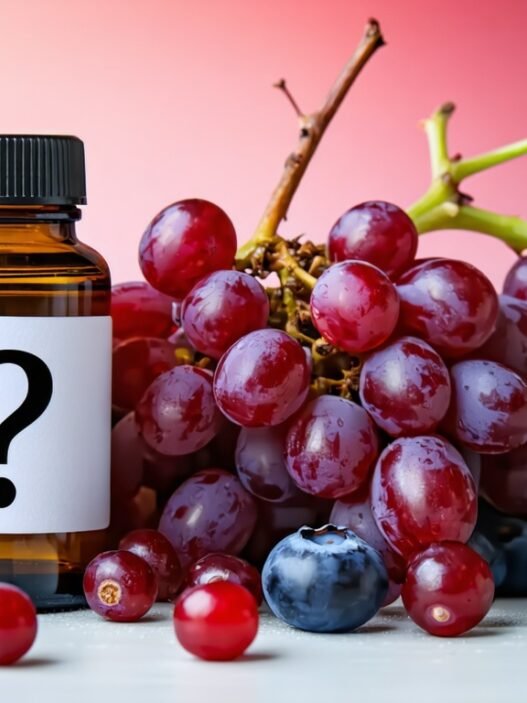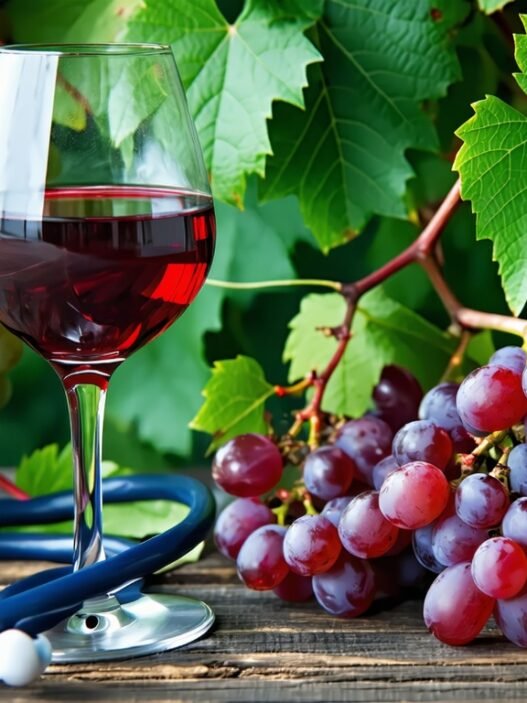Understanding Resveratrol
Introduction to Resveratrol
Resveratrol is a natural stilbene and a non-flavonoid polyphenol known for its various pharmacological activities. It possesses antioxidant, anti-inflammatory, cardioprotective, and anti-cancer properties. Research indicates that resveratrol may help in reversing multidrug resistance in cancer cells and sensitize them to standard chemotherapy treatments.
The question of whether resveratrol is anti-carcinogenic attracts attention due to its health-promoting qualities. Resveratrol is believed to aid in reducing inflammation, lowering “bad” cholesterol levels, and preventing clot formation, which can lead to heart attacks, thereby potentially offering protection against cardiovascular diseases. Its multifaceted benefits make it a significant subject of study in the field of health and wellness.
Sources of Resveratrol
Resveratrol can be found in various dietary sources, which can help individuals incorporate it easily into their diets. The most common sources include:
| Food Source | Resveratrol Content (mg per 100g) |
|---|---|
| Red Wine | 1.2 – 5.8 |
| Grapes | 0.24 – 1.0 |
| Peanuts | 0.01 – 0.4 |
| Blueberries | 0.05 – 0.3 |
| Dark Chocolate | 0.5 – 1.0 |
Red wine, especially, has garnered attention for its high resveratrol content, along with various bioactive compounds such as flavonoids and catechins. This has led to discussions surrounding the health implications of wine consumption and the overall benefits of incorporating resveratrol-rich foods in a balanced diet.
Those exploring the potential advantages of resveratrol should be mindful of the diverse food sources available. For further insights into possible drawbacks and who may need to be cautious with resveratrol intake, refer to our article on why is resveratrol controversial and who should avoid it?.
Health Benefits of Resveratrol
Resveratrol, a natural compound found in various plants, offers numerous health benefits that support overall wellness. From improving heart health to enhancing metabolic function, this powerful antioxidant has gained significant attention in health and wellness circles.
Cardiovascular Benefits
Resveratrol has been recognized for its cardioprotective effects. It helps improve cardiovascular function by reducing inflammatory states, preventing ventricular remodeling in diabetic hearts, and demonstrating vasodilation properties. Additionally, resveratrol has been associated with decreased hypertension and a reduced risk of cardiovascular diseases (PubMed Central).
Some of the key cardiovascular benefits of resveratrol include:
- Reducing low-density lipoprotein (LDL) oxidation
- Inhibiting platelet aggregation
- Potentially protecting against atherogenesis
Despite these benefits, it is important to note that some studies have not found significant benefits from resveratrol supplementation on cardiovascular risk factors (Memorial Sloan Kettering Cancer Center).
| Benefit | Description |
|---|---|
| Improved Cardiovascular Function | Enhances heart performance in diabetic conditions |
| Reduced Inflammatory States | Diminishes inflammation affecting the heart |
| Prevention of Ventricular Remodeling | Protects the structure of the heart in diabetes |
Metabolic Health Benefits
Research has shown that resveratrol may help improve metabolic health by enhancing insulin sensitivity and reducing the risk of type 2 diabetes. Moderate consumption of red wine, a common source of resveratrol, as part of a Mediterranean diet is associated with lower glucose levels and improved insulin sensitivity (PubMed Central).
Some metabolic health benefits include:
- Improved glucose metabolism
- Enhanced insulin function
- Lower incidence of type 2 diabetes
Anti-inflammatory Effects
Resveratrol exhibits notable anti-inflammatory properties, which can contribute to overall health and wellness. By inhibiting inflammatory pathways in the body, resveratrol can help reduce chronic inflammation, which is linked to various diseases, including heart disease and cancer. This anti-inflammatory effect supports the body’s ability to maintain proper functioning and reduce disease risk.
Neuroprotective Properties
In addition to cardiovascular and metabolic benefits, resveratrol has shown promising neuroprotective effects. It can improve cell survival while inhibiting apoptosis, inflammation, and oxidative stress in neurodegenerative disease models such as Alzheimer’s, Parkinson’s, and Huntington’s diseases (NCBI). This suggests that resveratrol may play a role in safeguarding brain health and enhancing cognitive function.
| Benefit | Description |
|---|---|
| Improved Cell Survival | Supports the longevity of brain cells |
| Inhibition of Apoptosis | Protects cells from programmed cell death |
| Reduction of Inflammation | Diminishes inflammation in neurodegenerative conditions |
The diverse health benefits of resveratrol make it a compound of interest in the field of natural health and holistic wellness. For those looking into the potential of resveratrol, it is essential to consider its implications in various areas of health, especially when exploring the question of is resveratrol anti-carcinogenic?.
Resveratrol and Cancer Prevention
Resveratrol has garnered attention for its potential role in cancer prevention. Numerous studies suggest that this compound exhibits anti-cancer properties, contributing to its status as a natural health supplement.
Anticancer Effects
Resveratrol shows promising antitumor activity and is highlighted as a candidate for preventing and treating various types of cancer. Research has confirmed its ability to inhibit multiple stages of carcinogenesis, including initiation, promotion, and progression. A study conducted on both in vitro and in vivo models validates resveratrol’s anticancer properties.
The table below summarizes some of the cancer types studied in relation to resveratrol’s efficacy:
| Cancer Type | Anticancer Effect |
|---|---|
| Breast Cancer | Induces apoptosis in tumor cells |
| Leukemia | Suppresses free radical formation |
| Colon Cancer | Inhibits cell growth and metastasis |
| Prostate Cancer | Affects angiogenesis and cell cycle regulation |
Inhibiting Carcinogenesis
Resveratrol plays a crucial role in inhibiting events linked to tumor initiation. It has shown the ability to suppress free radical formation in human leukemia cells, which is vital to preventing the initiation of cancer. Additionally, resveratrol modulates cytochrome P450 enzymes and detoxification enzymes, further aiding in the inhibition of early carcinogenesis stages (NCBI).
Supporting Chemotherapy
Recent studies suggest that resveratrol may complement chemotherapy treatments. It has been found to induce apoptosis in human tumor cells through various pathways, impacting cell growth regulation, metastasis, and angiogenesis. Resveratrol affects both intrinsic and extrinsic apoptosis pathways, along with regulating essential cell cycle proteins and inhibiting critical signaling pathways such as PI3K/Akt/mTOR, MAPK, and NF-κB to enhance the effectiveness of chemotherapy (NCBI).
In conclusion, the investigation into the anticancer potential of resveratrol is ongoing, and the evidence leans towards its presence as an ally in lowering cancer risk and supporting traditional cancer treatments. For more insights into the broader health implications of resveratrol, explore our articles on does resveratrol reverse aging? and why is resveratrol controversial and who should avoid it?.
Mechanisms of Resveratrol
Resveratrol has garnered attention for its promising health benefits, particularly concerning its mechanisms at the cellular level. Understanding these mechanisms can shed light on how resveratrol may contribute to anti-aging and cancer prevention.
Antioxidant Activity
Resveratrol possesses notable antioxidant properties, which play a crucial role in neutralizing harmful free radicals in the body. These free radicals can lead to oxidative stress, a contributor to aging and various diseases, including cancer. Research indicates that resveratrol can prevent lipid oxidation, thereby enhancing the stability and shelf life of pharmaceutical products (PubMed Central).
It is important to note that resveratrol can exhibit both antioxidant and pro-oxidant behavior, depending on concentration and conditions. At low concentrations, it tends to act as an antioxidant, while higher concentrations may induce oxidative stress and DNA damage (NCBI). This duality highlights the need for cautious dosing when considering its supplementation.
| Concentration Level | Effect |
|---|---|
| Low | Antioxidant activity |
| High | Potential pro-oxidant effects |
Activation of SIRT1 Gene
Resveratrol is known for its role in activating the SIRT1 gene, which is associated with longevity and metabolic regulation. The SIRT1 gene is part of the sirtuin family, implicated in cellular processes like aging, inflammation, and stress resistance. Activation of SIRT1 has been linked to improved mitochondrial function and regulation of oxidative stress. This pathway is significant in managing neurodegenerative diseases and enhancing overall vitality.
Activation of SIRT1 may also lead to beneficial effects on cellular functions, including improved insulin sensitivity and increased fat metabolism, making it a focal point in studies regarding metabolic health and longevity.
Impact on Cell Functions
Resveratrol influences various cell functions that are vital for maintaining health and preventing disease. Its anti-inflammatory effects can lower inflammation levels, which are often elevated in chronic diseases. In this context, resveratrol aids in regulating cellular signaling pathways, enhancing cell survival, and potentially lowering the risk of carcinogenesis.
The compound’s ability to affect cellular functions underscores its potential in mediating health benefits beyond mere antioxidant activity. For instance, its interactions with cellular pathways may support improved cardiovascular functionality and neuroprotective responses against neurodegenerative diseases.
By understanding how resveratrol operates at the cellular level, individuals interested in natural health and holistic wellness may explore its potential benefits more effectively. For further insights into the safety and use of resveratrol, check out our article on why is resveratrol controversial and who should avoid it?.
Safety and Metabolism of Resveratrol
Understanding the safety and metabolism of resveratrol (RV) is essential for natural health and holistic wellness seekers interested in its potential benefits. The bioavailability, metabolism within the body, and results from clinical trials highlight the complexities surrounding this compound.
Bioavailability
Resveratrol’s bioavailability is notably impacted by its low solubility and rapid metabolism. After oral intake, studies indicate that only trace amounts of un-metabolized resveratrol are present in plasma due to its rapid conversion into glucuronides and sulfate metabolites in the liver. Additionally, resveratrol can form complexes with transport proteins and lipoproteins, affecting how it is absorbed and utilized in the body.
| Component | Effect on Bioavailability |
|---|---|
| Low Solubility | Reduced absorption efficiency, limiting therapeutic potential. |
| Rapid Metabolism | Converts quickly to glucuronides and sulfate, decreasing un-metabolized levels in blood. |
| Complex Formation | Enhances interactions with transporters, impacting overall bioavailability. |
Metabolism in the Body
Resveratrol undergoes extensive metabolism after consumption. It is primarily metabolized in the liver and is often found in the bloodstream as conjugated glucuronides or sulfate forms (NCBI). The ability of resveratrol to act as an antioxidant or pro-oxidant is influenced by its concentration and may vary based on treatment conditions and cell types. At lower concentrations, resveratrol exhibits antioxidant properties, while at higher concentrations, it may induce oxidative stress and DNA damage, especially in cancer cells (NCBI).
Clinical Trials and Safety
Clinical studies evaluating resveratrol supplementation have shown that it is generally safe and well-tolerated at doses up to 5 grams per day. However, some participants have reported gastrointestinal symptoms at higher doses. It is crucial for individuals considering resveratrol supplementation to consult relevant resources and healthcare professionals to determine suitable dosages, especially as it may interact with other medications.
The safety profile of resveratrol demonstrates its potential as a beneficial supplement for many, but it is essential to be aware of possible side effects and interactions. For further exploration on the topic, readers can consult articles on why is resveratrol controversial and who should avoid it?, is resveratrol bad for the heart?, and is resveratrol bad for thyroid?.
Resveratrol in Wine
Wine, particularly red wine, is often praised not only for its taste but also for its potential health benefits, largely attributed to its resveratrol content. This section examines the levels of resveratrol in wine, its role, and the health implications of wine consumption.
Resveratrol Content in Wine
Resveratrol belongs to the stilbene family and is a bioactive compound found in wine. Its concentration can vary significantly based on factors such as grape variety, viticulture practices, and winemaking techniques. Typically, red wines have higher resveratrol levels compared to white wines, as the production of white wine usually involves less contact with grape skins PubMed Central.
| Wine Type | Resveratrol Content (mg/L) |
|---|---|
| Red Wine | Higher levels generally |
| White Wine | Lower levels |
Role of Resveratrol in Wine
In addition to its role as an antioxidant, resveratrol contributes to the overall phenolic profile of wine, alongside other beneficial compounds like flavonoids and stilbenes. Red wine contains approximately 1531-3192 mg of total phenolic compounds per liter, while white wine has around 210-402 mg/L PubMed Central. These compounds work synergistically, providing various health benefits, including improving cardiovascular health and enhancing insulin sensitivity.
Quercetin is a prominent flavanol found in red wine, with an estimated concentration of 50 mg/L. Quercetin possesses antioxidant properties and aids in modulating gene expression related to cell protection PubMed Central.
Health Implications of Wine Consumption
Moderate consumption of red wine, particularly within a Mediterranean diet, has been associated with numerous health benefits. Studies suggest that such consumption can lead to improvements in cardiovascular health, better insulin sensitivity, and a lower risk of type 2 diabetes and neurodegenerative diseases PubMed Central. For those interested in how these benefits may relate to resveratrol’s anti-carcinogenic properties, exploring whether resveratrol is anti-carcinogenic? could provide additional insights.
Epidemiological evidence also indicates that moderate red wine consumption may reduce the risk of cardiovascular diseases and lower all-cause mortality compared to those who abstain from alcohol. The combination of meal consumption and moderate wine intake may lessen the adverse effects of alcohol while enhancing antioxidant and detoxifying defenses PubMed Central.
In light of these findings, it’s essential for individuals seeking natural health and holistic wellness to consider the potential benefits of moderate wine consumption while remaining mindful of overall lifestyle choices.










